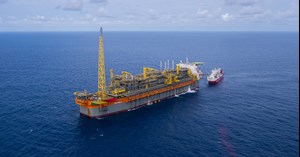No plans to curtail exploration, production in oil-rich Guyana, ExxonMobil reports
(Bloomberg) – Exxon Mobil Corp. pledged not to curtail exploration or production plans in Guyana as Venezuelan President Nicolas Maduro continues to ramp up his territorial claims in the region.
Exxon is “very focused on executing our operations within our defined contract area,” upstream president Liam Mallon said in an interview with Bloomberg TV. The Texas oil giant now produces about 645,000 bpd from Guyanese waters, up from nothing five years ago.
“This development has many years ahead of it and we’re not going anywhere,” Mallon said. “We’re delivering and we’re developing and we’re continuing to spread the benefits to Guyana within our area of operations. The matter for discussion with the borders is really a government matter.”
On Monday, Maduro warned Exxon not to enter an area near the border “yet to be demarcated.” The Venezuelan leader held a referendum in December that laid claim to the Essequibo region that makes up two-thirds of Guyana, a dispute that goes back more than 100 years but had laid largely dormant until the discovery of oil a decade ago.
Previously, Exxon said its exploration plans for 2024 will be “well south” of any area being claimed by Venezuela. Guyana has the support of the U.S. and most Western nations in the dispute, which is currently working its way through the International Court of Justice.
Guyana is taking Venezuela’s threats seriously, but investors have no reason to worry because there’s “no doubt as to where our borders are,” President Irfaan Ali told Bloomberg TV. The country of 800,000 people is working with international partners including the U.S., UK, France, Canada and Brazil to keep peace in the region, he said.
“We are a country that abides by international law and that is why we respectfully ask Venezuela to participate and be a responsible member of the international community and respect the ICJ,” Ali said. “We are very sure of our case. We are very sure of our borders.”
Separately, Exxon expects to reach a final investment decision on its sixth offshore development in Guyana by the end of the first quarter, pending government approvals, Mallon said. It will also complete a pipeline bringing gas from the offshore wells to a new power plant in Guyana in the next year or so.
“That in itself will halve electricity costs to the people of Guyana and comes with significantly lower emissions than the alternative, which is imported fuel oil,” Mallon said. The project will allow “the country to grow and expand and spread those benefits into society at large.”



